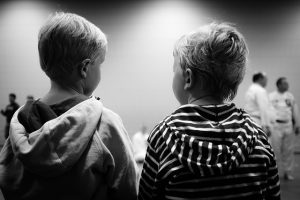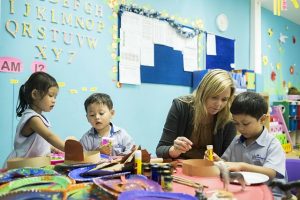It’s often thought of as tacky, but is it really?
Re-gifting is the practice of individuals giving unused gifts that they received from others.
Declared a national holiday by money management website Regiftable.com, National Re-gifting day is celebrated each year on the third Thursday in December.
The date was chosen because it’s when companies are most likely to hold their office holiday parties giving individuals the chance to offload unwanted or unused gifts.
Re-gifting as a teaching tool

At first glance you might not believe that regifting offers any benefit…other than perhaps cleaning out your closets, but this common practice gives parents and child care educators the perfect opportunity to teach kids how to share.
Thoughtful giving
Gift giving is a way to show someone that you care. Help children to understand that giving someone a gift is not a way to “show off”, so there’s no need to spend more than your budget allows.
In fact, in classroom situations, teachers set a limit on the amount each student can spend to avoid the chance of any hurt feelings.
To help children connect with the purpose of gift giving, ask each child about the last present they received. Who gave it to them? How did it make them feel?
Discuss what the other person must have been thinking when they gave it to them and ask what they think this person might like to receive from them.
Gracious receiving
The other side of giving is, of course, receiving.
Remind each child that the intent behind gift giving is many times more important than the actual gift itself and to show their appreciation.
After all, it really is the thought that counts.
Earth friendly
Re-gifting something that someone else would use and enjoy is also good for the planet.
Include the idea of regifting when discussing the topic of recycling with your class. It provides a concrete example that’s easy for children to understand.
Helping others
Have your class take part in community gift giving efforts such as Toys for Tots.
Take the opportunity to discuss just how much of an impact they can make in the lives of other kids, just like them, who may not have as great of a Christmas as they will.
Re-giving do’s and don’ts
Etiquette is important if you choose to regift. Following are some commonly accepted “rules” when regifting:
- You must be transparent about the gift – don’t pass it off as a newly purchased item.
- The item should be unopened, in its original packaging.
- Don’t re-gift handmade items.
- Don’t unload something unless you know the recipient will have a good use for it.
- Remove the gift tag first!
- Don’t re-gift something your child received from someone special…instead, have them use it when the gift giver is around to show their appreciation (e.g. the bunny suit in The Christmas Story!)
- Avoid re-gifting within the same social circle.
- Don’t re-gift something unless you know exactly who gave it to you.







 According to
According to